Image

Urban Centre of Good Initiatives - CUIB
Published on 21 January 2021

Romania
Nord-Est
This is the good practice's implementation level. It can be national, regional or local.
About this good practice
Problem: A/the central challenge of the 21st century is to achieve sustainable living, while respecting the natural boundaries of our planet.
Context: CUIB is engaged in four areas of activity: ecology and environmental protection, education for sustainable development, social economy, and civic responsibility. The actions in these fields are driven by the concept of thinking globally while acting locally.
Since December 2013, CUIB has put Iași in the spotlight of socio-economic initiatives across Europe, through integrating the following principles:
• zero waste - while we already use only reusable packaging for food to go and we collect selectively the waste, better eco-consumables options
• energetic transition - replacement by all/most old equipment with new A++ , cargo-bike
• solidarity food - warm soup delivery for the homeless
• indoor greenhouse - at least for aromatic herbs and edible plants
• food waste reduction – by recovering food ingredients
• km 0/ local - ingredients with the smallest carbon footprint
• natural - toxic free ingredients, preferably eco-certified, if available locally;
• in season/ fresh - in order to avoid unnecessary ecological footprint while conserving food
• animal free products- years it offers vegan options for all menu items
• slow food/ forgotten ingredients - presence in the menu of ingredients like kale
• free water - testing of the best water filters for domestic use in terms of price/ efficiency
Context: CUIB is engaged in four areas of activity: ecology and environmental protection, education for sustainable development, social economy, and civic responsibility. The actions in these fields are driven by the concept of thinking globally while acting locally.
Since December 2013, CUIB has put Iași in the spotlight of socio-economic initiatives across Europe, through integrating the following principles:
• zero waste - while we already use only reusable packaging for food to go and we collect selectively the waste, better eco-consumables options
• energetic transition - replacement by all/most old equipment with new A++ , cargo-bike
• solidarity food - warm soup delivery for the homeless
• indoor greenhouse - at least for aromatic herbs and edible plants
• food waste reduction – by recovering food ingredients
• km 0/ local - ingredients with the smallest carbon footprint
• natural - toxic free ingredients, preferably eco-certified, if available locally;
• in season/ fresh - in order to avoid unnecessary ecological footprint while conserving food
• animal free products- years it offers vegan options for all menu items
• slow food/ forgotten ingredients - presence in the menu of ingredients like kale
• free water - testing of the best water filters for domestic use in terms of price/ efficiency
Resources needed
In order to scale and replicate the model (limited space at the moment) and in order to increase the impact of the initiative within a more generous space, a budget of about 300 000 EUR is needed for reaching the break even point with the new setting.
Evidence of success
Perceived as a niche project by everybody, considered radical by most business advisors questioned or as a project ahead of its time by the connaisseurs, CUIB escaped marginality in 5 years. Now it is one of the most popular bistros. CUIB contributed to the reduction of above 40 t of CO2 from the atmosphere, reduction of over 111 000 packaging materials, provide warm soups for over 100 homeless people in the last three winters, supporting tens of local small producers, to sell.
Potential for learning or transfer
CUIB is a pioneer project – an attribute that, in general, if it does not confer weight, at least has a positive connotation. The value of the meaning of the term lies not so much in the sense of being the first, as in inspiring through a first step on a terrain that can then be well beaten, to create levers of action, to launch an invitation to replication.
It was the holistic approach that guided all stages of the project from imagining the idea, to putting it on paper, development, implementation, launching and current management. Based on the functioning of this approach, the CUIB integrates objectives relating to the three dimensions of sustainable development, namely the natural, social and economic environment and the vision of a better world, governed by sound, environmentally sustainable and socially equitable ethical norms and principles.
The potential for learning and transfer is unlimited, all HORECA actors can approach our practices.
It was the holistic approach that guided all stages of the project from imagining the idea, to putting it on paper, development, implementation, launching and current management. Based on the functioning of this approach, the CUIB integrates objectives relating to the three dimensions of sustainable development, namely the natural, social and economic environment and the vision of a better world, governed by sound, environmentally sustainable and socially equitable ethical norms and principles.
The potential for learning and transfer is unlimited, all HORECA actors can approach our practices.
Further information
Website
Good practice owner
You can contact the good practice owner below for more detailed information.
Organisation
For the Better

Romania
Nord-Est
Contact
Expert